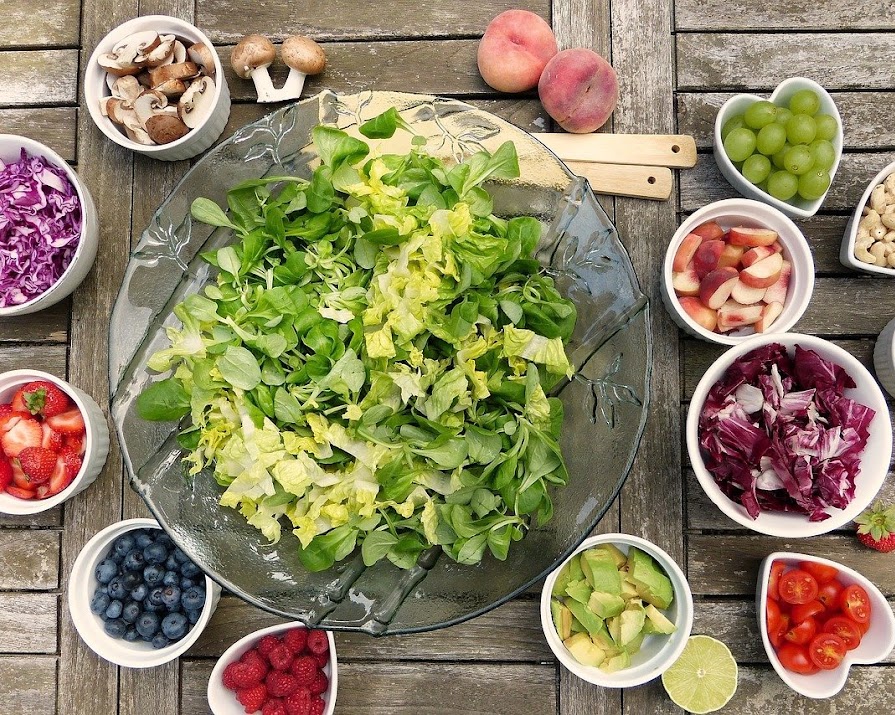
6 steps to improve your gut health, according to a gastroenterologist
By IMAGE
23rd Sep 2023
23rd Sep 2023
Gastroenterologist and gut expert Professor Barbara Ryan (@Thegutexperts) on why our gut health is important and how to keep it happy.
We can change our overall health by making small changes. Diet should not just be about losing weight; it should be about eating for health and wellbeing. Simple changes in our diet can do much to improve our gut and overall health, such as reducing our risk of heart disease and stroke, reducing the risk of Type 2 diabetes and cancer and improving our bone health as we get older.
Here are 6 simple changes we can make in our own and our families’ diets, which will result in both immediate and long-term health benefits.
Professor Barbara Ryan is a Consultant Gastroenterologist in a Dublin University Hospital and a Clinical Professor at Trinity College, Dublin.
1 Eat more plant-based foods
Plant-based foods (vegetables, fruit, salads, grains and legumes) are naturally low in fat, low in calories, high in fibre and contain bulk, which is filling and satisfying.
You do not have to eat exclusively plant-based diets (vegan or vegetarian) to reap the health benefits of plant-based foods. Many of us do not eat enough plant-based foods, and I would ask you to look at your daily diet to see how much is coming from plant-based foods.
Each day, you should aim to eat 3-4 portions of wholegrain cereals and breads or legumes, as well as 5-7 portions of fruit, vegetables or salad.
It is good if you vary the types of plant-based foods in your diet and to help you do this try to choose vegetables of different colours. Some sources are telling us to eat 30 or more different types of plant-based foods each week, to ensure the health and diversity of our gut bacteria. Having increased diversity of bacteria within the gut has been associated with many health benefits so aim to have between 10 and 20 different types in your weekly diet.
2 Find your fibre balance
Fibre is one of nature’s super-foods and increasing fibre intake in the diet has been proven to have many benefits for the digestive system and for overall health. Fibre comes from the plant-based foods that we just talked about. For overall health, fibre reduces the risk of heart disease and stroke, reduces the risk of certain cancers, Type 2 diabetes and reduces bad cholesterol.
In terms of gut health, fibre increases the bulk of the stools and improves motility and transit through the bowel, resulting in a more regular bowel pattern, which is particularly helpful for people who suffer from constipation. Fibre also acts as a food for the healthy bacteria that live in the gut, and increased fibre increases the number and type of bacteria in the gut.
Fibre can have some downsides for the gut and people differ in how much fibre they need or can tolerate. Too much fibre can result in bloating and increased flatulence, abdominal cramps and sometimes diarrhoea. This can be particularly problematic for someone who suffers from a digestive condition such as IBS.
The recommended daily intake of fibre varies a little from country to country, but ranges from 20-35g per day. There are many resources available to help you work out your daily fibre intake. If your intake is too low, you should try to increase it gradually by 5g per week to find the balance that is right for you. Increasing it too quickly may result in some of those unpleasant digestive effects I mentioned above.
3 Good fats
How often have you heard people talking about good and bad fats, or good cholesterol and bad cholesterol? The terms can be confusing, but there are some simple rules and if you know these you are all set to make the right choices. There are three main kinds of fat in foods: Saturated fats, unsaturated fats and trans-fats (also known as trans-saturated fats).
Let’s discuss the last type first – trans-fats; these are generally produced industrially and in highly processed and fast foods. Cheap margarine is an example of a trans-fat. They occur naturally in small amounts in some meats. Trans-fats are bad for you full stop and should be avoided. Denmark banned the use of trans-fats in the food industry in 2003 and several other European countries have followed suit.
The second type of fat is saturated fat. You can recognise saturated fats as those that are solid are room temperature- think animal fats such as butter and the fat on meats, and also coconut oil. Saturated fats are bad for you if they constitute too much of the fat in your diet. They do not have any recognized health benefits, apart from being rich in fat-soluble vitamins (A, D, E and K). Diets high in saturated fats (generally from meat and dairy sources) are associated with an increased risk of heart disease, obesity and other problems.
It is recommended that only a third of your fat intake should come from saturated fats.
The third type of fat is the good type; these are unsaturated fats – this should make up two-thirds of your fat intake. Just to make things a little more confusing, there are two types of unsaturated fats: poly-unsaturated fats (the ones you have probably heard of are omega-3 and omega-6) and mono-unsaturated fats. In general unsaturated fats are liquid at room temperature, such as all the vegetable and nut oils we use. Different plant, nut and seed oils have different mixes of mono- and poly-unsaturated fats and it is good to vary the type you use in your cooking to get the benefits. Oily fish is also an excellent source of omega-3 polyunsaturated fats.
The benefits of unsaturated fats include reduced risk of heart disease and stroke and reduced bad (LDL) and increased good (HDL) cholesterol. There is also some evidence to suggest that omega-3 oils are good for brain function as we age and may also reduce inflammation in the body.
4 Vitamin D
Vitamin D has come of age as vitamins go. We are increasingly recognizing the many and varied effects of this wonderful vitamin. It has been shown that low vitamin D levels are associated with a worse outcome if you happen to get Covid-19 infection. Vitamin D is vital for the health of our bones and teeth, as it helps absorb calcium and phosphorus from the diet. As we get older, our bones become thinner, which can lead to osteoporosis. Women are at much greater risk of osteoporosis than men and this risk increases significantly after menopause. Vitamin D also has important anti-inflammatory effects and has been shown to be beneficial in a number of inflammatory conditions and to reduce the risk of certain cancers.
We can get vitamin D from our diet and from the action of sun on our skin. Given that we don’t get much sun in Ireland, and when we do, we are advised to use sunscreen, dietary sources of vitamin D are very important.
The best dietary sources of vitamin D are oily fish, fortified dairy produce and eggs.
The recommended intake of vitamin D is between 400-800iu (10-20g) per day. An average portion of oily fish contains 8-10?g of vitamin D, which is half your daily requirement, and one egg contains 2?g. People at increased risk of having low vitamin D are the over-65s (a recent Irish study showed that 20% of older Irish adults were vitamin D deficient in winter and 13% in summer), pregnant and breast-feeding women, vegans and people who have low exposure to sun.
If you feel that you are not getting enough vitamin D in your diet, take a supplement, particularly in autumn or winter.
5 Eat more fish
We are in island nation and yet we do not each much fish – we eat less than half of what the Portuguese and Spanish eat. I want you to try to eat fish 2 to 3 times per week.
Fish is absolutely brimming with vital nutrients. Like other animal-based proteins (as opposed to plant-based), fish protein is a complete protein, which means that it contains all the protein building blocks (called amino acids) that we need for health.
However, unlike meat, fish is low in saturated fats and high in poly-unsaturated fat, which as we mentioned above, is the right combination of fats for health.
Oily fish such as salmon has the highest content of good fats (mainly omega-3), with herring, halibut, sardines and mackerel containing lesser amounts. White fish, which is low in oil, is an excellent source of protein. Some larger fish, such as tuna, can concentrate mercury and should not be consumed in large amounts, particularly when pregnant. As well as being an excellent source of vitamin D, oily fish is also a great source of selenium and iodine (needed for thyroid function) and it’s quick and easy to cook.
6 Drink less alcohol
Women can tolerate less alcohol than men, as female livers are 30% smaller. Guidelines recommend that women should not drink more than 10-11 units of alcohol per week (remember this is 35mls of spirits, or 100mls of wine, which equates to about ½ a glass, or ½ a pint of beer or cider).
It is good to have several alcohol-free days in a week and to limit drink only 2-3 units in one sitting. Alcohol is high in ‘empty’ calories (meaning that it has no nutritional value) and contributes to weight gain. It damages the liver when consumed regularly. It also has a negative effect on mood and quality of sleep.
If you are a bit concerned that you are drinking too much then you probably are. Similarly, if you know exactly how many units of alcohol you drink in a week, this may mean that you are drinking too much. So cut back and you will hopefully see the benefits on your waistline, your sleep and your mental health.
Making these 6 simple changes to your diet can have immediate, noticeable changes to your gut health and overall feeling of wellbeing. In the longer term, they will also reduce your risk of many chronic illnesses and help you maintain strong and healthy bones. If you can fit in some regular exercise and adequate sleep, you’re on the right track.
Check out An Bord Bia or the Healthy Ireland website; both are excellent resources regarding diet and gut health.
This article was originally published in December 2022.






















